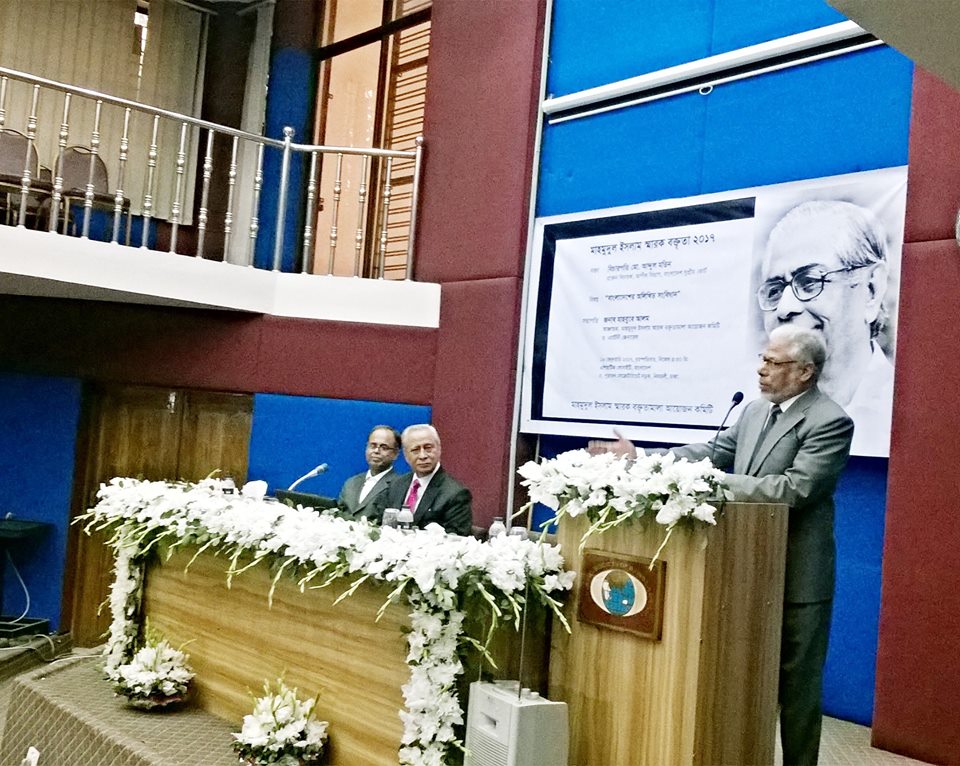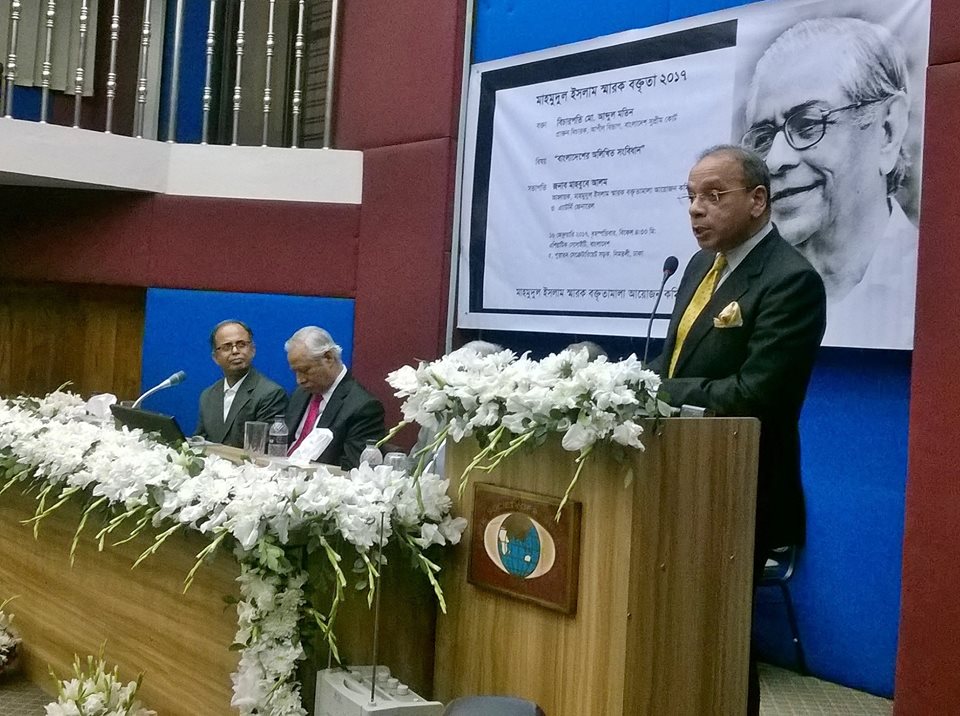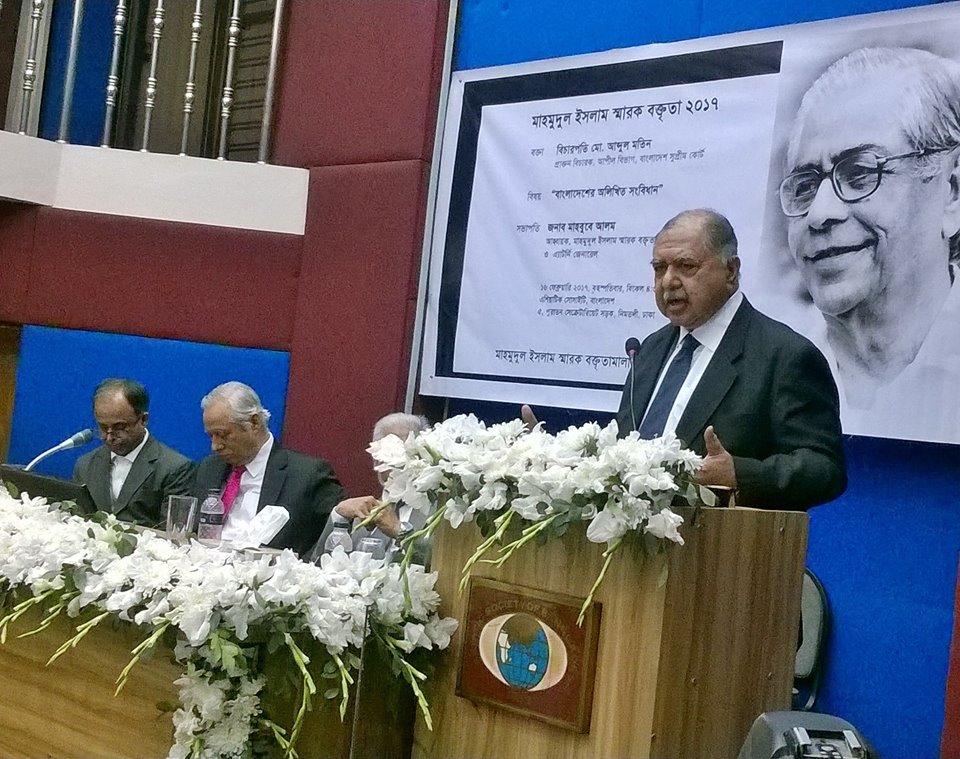By Ali Mashraf
Advocate Mahmudul Islam, former Attorney General and one of the most prominent lawyers of Bangladesh breathed his last on February 16, 2016. A career spanning over 50 years, Mahmudul Islam not only made his mark as a legal practitioner, but also made significant contribution in the academic field by penning books that are now regarded as the most thorough and in-depth works ever in the legal arena.
Commemorating his first death anniversary, the inaugural Mahmudul Islam Memorial Lecture 2017 was organized on February 16, 2017 at the Asiatic Society Auditorium, Dhaka. Former Justice of the Appellate Division of the Supreme Court of Bangladesh, Justice Md. Abdul Matin delivered the lecture on ‘The Unwritten Constitution of Bangladesh’ at the event. Current Attorney General, Mahbubey Alam presided over the lecture.
The event started with the introductory speech by Advocate Probir Neogi, Senior Advocate of the Supreme Court of Bangladesh. He recalled the efforts of Mahmudul Islam to ensure a free, fair parliamentary election in Bangladesh during the case of Abdul Momen Chowdhury v. Bangladesh that established the system of the election candidates to disclose their full background for a thorough scrutiny by the electorates.
He opined that this verdict paved way for the electorates to assess the merit of all the candidates in an election resulting in the best possible candidate to get elected. He also remarked that the topic of the day’s lecture ‘The Unwritten Constitution of Bangladesh’ was very crucial in shaping the Constitution and Constitutional law.
Following the introductory speech, Justice Abdul Matin delivered his lecture for the event. Reflecting on Mahmudul Islam’s life, Justice Matin remarked that Mahmudul Islam earned the title of ‘mobile encyclopedia’ of law for his experience and his unwavering dedication and integrity. He recalled that Mahmudul Islam was always surrounded by lawyers who sought his insights and advice on innumerable cases and never disappointed anyone. For this, Justice Matin claimed that Mahmudul Islam was an ‘oracle of law’- a very dependable person for the judges and lawyers to solve cases.

Photo: Muntasir M. Rahman
Justice Matin further added that his busy legal career did not bar Mahmudul Islam from penning significant books on Constitution and as such, his whole life was like ‘a candle burning from both ends’for his service to the legal field.
He asserted that Mahmudul Islam belonged to the natural law school and held the belief that the authority of law did not derive from the power of a political ruler, but from a higher entity. He compared Mahmudul Islam to the likes of St. Thomas Aquinas, Hugo Grotius, Sir Edward Coke and other legal philosophers but concluded saying that Mahmudul Islam carved a place of his own for his multi-faceted thinking and observation on legal issues.
Justice Matin also mentioned the significant contribution Mahmudul Islam had on the issues of Constitution and Constitutional law including his significant comments on various provisions including articles 7(A) and 7(B), 37, 39 and 49, the insertion of the 5th, 6th and 7th schedules as well as the abuse of section 401 of CrPC. Justice Matin said that to pay homage to a great man like Mahmudul Islam, we should instill the spirit of liberty in everyone’s hearts, something he believed and worked.
Moving on to the academic part of his lecture on ‘The Unwritten Constitution of Bangladesh’, Justice Matin discussed on the historical development of precedent in the UK, USA and India. He reasserted the provision in article 111 of our constitution which states that law declared by the Appellate Division is binding upon the High Court Division and all other courts while the law declared by the High Court Division is binding upon the subordinate courts.
Referring to many landmark judgments of international courts as well as the judgments in our courts, Justice Matin discussed the importance of precedents in the judicial system of our country and claimed that these precedents are tools via which the interpreters in future would look into the Constitution to resolve cases and expound the Constitution.
Justice Matin ended his speech with two propositions; firstly, on attempting to establish a Mahmudul Islam Chair at his alma mater, University of Dhaka and secondly, to start the initiative of recording all the significant oral arguments of important cases; something the American Supreme Court is doing since 1955. These, Justice Matin believed, would be important instruments for law students, lawyers and judges of our country in the development and progress of the legal arena.
Justice Syed Refaat Ahmed, sitting judge in the High Court Division of the Supreme Court then shared his thoughts on the topic of the lecture. Justice Refaat shared a few personal experiences and said that knowing Mahmudul Islam in various capacities throughout his adulthood had left a lasting positive impact on himself. He pronounced Mahmudul Islam as amongst the extraordinary league of jurists that Bangladesh has produced. Addressing Justice Matin as his mentor, Justice Refaat remarked that his ability to summarize volumes of content within a short period of time precisely is something very rare and priceless these days.

Photo: Muntasir M. Rahman
Afterwards, prominent jurist Dr. Kamal Hossain shared his experiences with Mahmudul Islam, especially during the reign of the autocratic government of HM Ershad. He recalled the struggle of the bar as well as the bench during such trying times as the government bifurcated the High Court Division, setting up High Court benches in other districts of Bangladesh. He recollected the efforts of lawyers like Mahmudul Islam in the landmark case of Anwar Hussain Chowdhury v. Bangladesh that declared such act of the Ershad government ultra vires and in turn, restored the High Court Division.

Photo: Muntasir M. Rahman
In his concluding remarks, Attorney General Mahbubey Alam said that besides being immersed in his work, Mahmudul Islam always found time to study classic literature as well as the works of Rabindranath Tagore. He also said that Mahmudul Islam had profound love for his family members and his colleagues and would always ask about their well being.
Mahbubey Alam recalled that Mahmudul Islam sought to know about the condition of the court proceedings meticulously every day. He ended his speech saying that efforts would certainly be undertaken to ensure the recording of the oral submissions for a limited time period in the apex court as proposed by Justice Matin for the betterment of legal education and legal arena of Bangladesh.
The lecture was very helpful for law students and practitioners alike as they got to know about the work of Mahmudul Islam from people who worked with him and about his strong dedication and commitment to the legal arena. Aside from that, the lecture of Justice Matin on the unwritten constitution and precedents was also a great learning experience for them.
———————————————————————————————–
Ali Mashraf is a student of Department of Law at University of Dhaka



